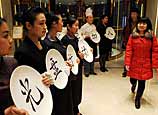
For his part, Alaa, a 34-year-old worker in the petroleum field, told Xinhua that Morsi's decision of imposing a curfew and a state of emergency "was correct, and also too late," noting that thugs have recently been prevailing in the city.
Alaa also denounced anti-Morsi protests and criticized the opposition's rejection of the president's invitation for dialogue, stressing that Morsi was a freely-elected president that should only be ousted through the ballot box.
Hours ago, Egypt's main opposition bloc, the National Salvation Front (NSF), announced at a press conference its refusal to Morsi' s call for dialogue. "The prosecutor-general should be sacked and a national salvation government should be formed," the NSF's leading member Hamdeen Sabahy said when stating some of the NSF's preconditions for engaging in the dialogue.
In Ismailia, 48-year-old Mohamed Saqr told Xinhua that thousands of people of all ages marched through the main Mohamed Ali, al-Thalathini and Reda streets toward al-Mamar Square in defiance of Morsi's recent decisions.
"We in Ismailia all strongly reject Morsi's decision to isolate us and separate the canal governorates from the rest of Egypt," Saqr added, wondering why Morsi did not impose a curfew in Cairo, where protests are still going on downtown.
Cairo, like Saqr said, has been witnessing continuous clashes all Monday until after midnight, with hundreds of both police forces and anti-government protestors injured near iconic Tahrir Square.
Among the protestors was Egyptian poet and writer Mehat al-Adl, who told Xinhua that he came to Tahrir to join the protestors because he believed there was no real change in the country over the past two years.

















 People on way home during Spring Festival travel rush
People on way home during Spring Festival travel rush


![]()
